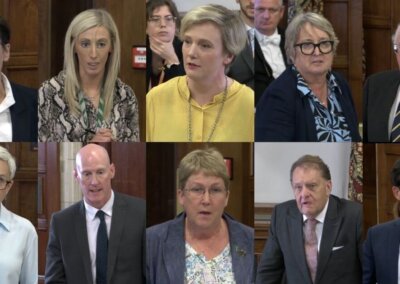Campaigners are calling on MPs to reject a new amendment tabled by Labour MP, Stella Creasy, to the Criminal Justice Bill that would make extreme changes to abortion laws.
The amendment (NC40) proposes making the biggest changes to abortion laws since the Abortion Act was introduced in 1967.
The proposed change to the law would make it more likely that healthy babies are aborted at home for any reason, up to birth, by removing key deterrents against performing an abortion at any point right through to birth.
The amendment would remove the possibility of custodial sentences for abortions after 24 weeks and by not suggesting any meaningful alternative sanctions, the amendment would remove a key deterrent against late-term abortions.
The amendment would also require the Director of Public Prosecutions (DPP) personally to approve prosecutions of women or abortion providers who perform abortions after the legal limit up to birth. This would introduce an extra hurdle before prosecutions can take place, which may deter police investigations, making abortions up to birth more likely. It would also likely lead to unreasonable pressure being placed on the DPP.
These changes to the law would likely lead to a significant increase in the number of women performing late-term abortions at home, endangering the lives of many more women.
They would also likely lead to an increased number of viable babies’ lives being ended well beyond the 24-week abortion time limit and beyond the point at which they would be able to survive outside the womb.
Making it easier to cover up infanticides
Stella Creasy’s amendment would remove key deterrents against hiding the body of a dead baby included in Section 60 of the Offences Against the Person Act 1861.
Section 60 makes it an offence to conceal the birth of a child by hiding the dead body of a child after its birth, including in circumstances when the baby has been killed through infanticide. This law change could make it easier to cover up infanticides.
Removing a series of key safeguards provided by the Abortion Act
The amendment would also remove a series of key safeguards provided by the Abortion Act through to 24 weeks.
It proposes making this law change by removing offences for women and doctors committed under sections 58 and 59 of the Offences Against the Person Act (OAPA) and the Infant Life (Preservation) Act (ILPA) through to 24 weeks.
As the Abortion Act was passed to create exemptions to sections 58 and 59 of the OAPA and the ILPA, removing such offences committed under sections 58 and 59 of the OAPA and the ILPA would make key safeguards provided by the Abortion Act 1967 redundant through to 24 weeks.
This means abortion would be available on demand, for any reason up to 24 weeks.
If the proposal becomes law, sex-selective abortion would become legal in England and Wales. Sex-selective abortion usually targets baby girls due to a preference among certain parents and some cultures for having sons. The Government maintains that, under our current legislation, abortion on the grounds of the sex of the baby is illegal because it is “not one of the lawful grounds for termination of pregnancy” set out in the Abortion Act, which stipulates that abortion can only be performed under specific grounds.
Under the proposed law change, the Abortion Act and the grounds under which abortion is permitted would effectively be made redundant up to 24 weeks, allowing abortion on demand, for any reason, including sex-selective abortion.
Section 1(3) of the Abortion Act restricts abortion to hospitals or places approved by the Secretary of State. Without this safeguard, there would be no legal restrictions on places where abortions could be performed up to 24 weeks.
The amendment would also result in there being no legal requirement that abortions take place under the care of a qualified doctor. Currently, the Abortion Act requires that an abortion takes place under the care of a registered medical practitioner (qualified doctor) who leads or directs the abortion process.
Under the proposed law change, there would also be no legal requirement that two qualified doctors certify an abortion. Section 1(1) of the Abortion Act requires two registered medical practitioners (doctors) to certify that an abortion is legal and is being performed under one of the grounds set out in the Abortion Act. Without this safeguard, there would be no legal requirement that two doctors certify an abortion up to 24 weeks.
Strong opposition from the public and medical professionals
Polling undertaken by ComRes shows that only 1% of women support introducing abortion up to birth and 70% of women would support a reduction in the time limit from 24 weeks to 20 weeks or below. The same polling showed that 91% of women agree that gender-selective abortion should be explicitly banned by the law.
Polling published by the Daily Telegraph shows that more than half of the general public agree that it should remain the case that a woman is breaking the law if she has an abortion of a healthy baby after the current 24-week legal time limit up until birth. Only 16% disagreed.
Over 750 medical professionals have now signed an open letter to MPs opposing making extreme changes to abortion legislation part of the Criminal Justice Bill.
A number of high-profile commentators in the media, some of whom take a pro-choice position on abortion, have come out against making extreme changes to abortion legislation, saying the proposals go “too far”.
Major campaign launched to oppose abortion up to birth
Following the tabling of Stella Creasy’s extreme abortion amendment, pro-life organisation Right To Life UK, has launched a major nationwide No To Abortion Up To Birth campaign focused on defeating attempts to hijack the Criminal Justice Bill that would introduce extreme changes to our abortion laws.
Right To Life UK is encouraging members of the public around the country to urgently contact their MP using the tool at www.righttolife.org.uk/uptobirth to ask their MP to oppose the introduction of extreme abortion laws.
Right To Life UK spokesperson, Catherine Robinson, said “These extreme changes to the law would remove key deterrents against performing an abortion at any point right through to birth. This would make it more likely that healthy babies are aborted for any reason, including sex-selective purposes, right up to and during birth”.
“It would likely lead to a tragic increase in the number of viable babies’ lives being ended through late-term abortions performed at home well beyond the 24-week abortion time limit, as well as the lives of many more women being endangered”.
“These extreme and radical abortion amendments have no place in the UK. Recent polling clearly shows that the public does not support these changes to the law. We are calling on MPs to reject these amendments and instead support Caroline Ansell’s amendment to lower the time limit, for which polling shows widespread public support”.
“We are calling on members of the public around the country to urgently contact their MP to ask them to oppose the introduction of extreme abortion laws”.












